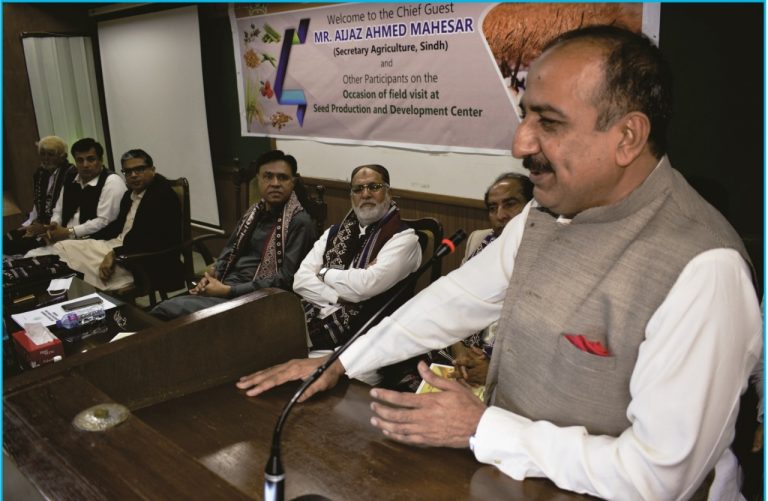
Sindh Agriculture University, Sindh Agriculture Department, Nuclear Institute of Agriculture, Progressive Farmers, and private sector agreed to form Sindh Agriculture Board to deal with the shortage of certified seeds and other related issues.
Tando Jam
The stakeholders at a seminar here termed the uncertified seeds coming from other areas including Punjab as harmful for the agriculture of Sindh and suggested activating Sindh Seed Corporation.
Sindh Agriculture University (SAU), Sindh government’s Department of Agriculture, Nuclear Institute of Agriculture (NIA), Progressive Farmers, and the private sector have agreed to form “Sindh Agriculture Board” to deal with the shortage of certified seeds and other related issues in Sindh province.
An Awareness Seminar was organized by the Seed Production and Development Center (SPDC) of Sindh Agriculture University on the preparation and propagation of seeds of different varieties of wheat in the Senate Hall of the University, on Friday.
Dr. Fateh Marri, Vice Chancellor, Sindh Agriculture University, said that the shortage of certified seeds is a major problem for farmers across the country, including Sindh, due to which the targets of agricultural development are still not achieved.
He said that economic growth of the country, food security, development of agro-industry including dairy, and export of by-products would be possible only when we will research on certified seeds of crops, fruits, vegetables, and when we preserve the high purebreds of our livestock indigenous breeds.
 Provincial Secretary Agriculture, Supply & Prices Department, Qazi Aijaz Mahesar said that more attention needs to be paid to agriculture, as entire agriculture depends on pure seeds and added that he could not understand why Sindh Seed Corporation could not give the desired results.
Provincial Secretary Agriculture, Supply & Prices Department, Qazi Aijaz Mahesar said that more attention needs to be paid to agriculture, as entire agriculture depends on pure seeds and added that he could not understand why Sindh Seed Corporation could not give the desired results.
“We have come to the point that if we don’t take it seriously, we will be left far behind, so joint research work will be started for the development and stakeholders-based Sindh Agriculture Board will be formed” he added.
Noor Mohammad Baloch, Director General, Agriculture Research Sindh, said that we are working on various projects with Sindh Agriculture University, and assured that full technical support will be provided for seeds.
Mehmood Nawaz Shah, Senior Vice President, Sindh Abadgar Board, said that 90% of the seeds of vegetable varieties are imported and most of the seeds of other crops also come from other provinces and abroad. The results are not good and Sindh needs a tradition of seed inspection and monitoring.
 Progressive farmer Syed Nadeem Shah said that as Pakistan was increasing its import bill for pulses, there should be research on pulses seeds in Sindh while verification of seeds coming from Punjab was required.
Progressive farmer Syed Nadeem Shah said that as Pakistan was increasing its import bill for pulses, there should be research on pulses seeds in Sindh while verification of seeds coming from Punjab was required.
Dr. Zahoor Soomro, Director, Seed Production and Development Center, briefed the experts and farmers about the extension work of seeds at Sindh Agriculture University.
Dr. Mujahid Hussain Leghari, Dr. Muhammad Ismail Kumbhar and others also addressed the seminar.
Renowned Agricultural Scientist Karam Khan Kaleri, Pro Vice Chancellor Dr. Jan Muhammad Marri, Dean Dr. Qamaruddin Chachar, Dr. Liaquat Bhutto, Tariq Khanzada, Dr. Maula Bux Kumbhar, Director Farms Mumtaz Ahmed Jakhro, Dr. Shahnawaz Marri, Wali Muhammad Baloch, Ghulam Sarwer Panhwar, Manzoor Ahmed Khuhro, Mustafa Nangraj and a large number of representatives of Famers and private sector attended the seminar.
Later, the guests visited the field of wheat and seeds of the Seed Production and Development Center of Sindh Agriculture University, while the Secretary Agriculture and other experts visited the Disease Free Mango Nursery of the University. (PR)
__________________